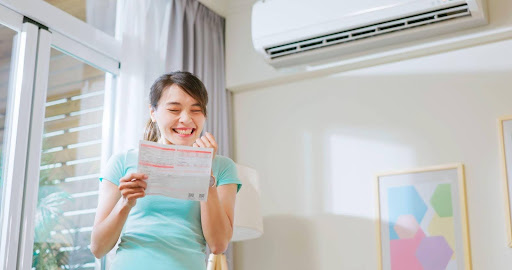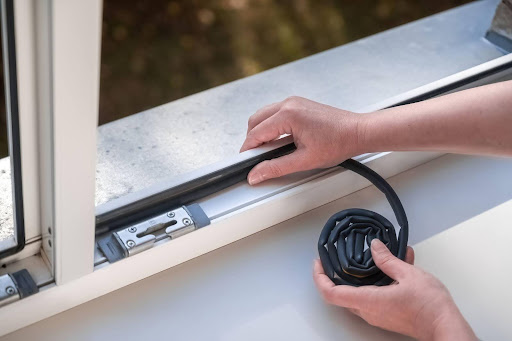As a renter, you might feel limited in how to save money on utilities, but there are plenty of strategies to cut down on your bills. From tweaking daily habits to upgrading your apartment’s appliances, this article will provide practical tips and tricks that lower your energy consumption and help you save each month.
How to Lower an Electric Bill in an Apartment
As temperatures rise during the summer, so can the cost of your apartment’s electric bill, especially in an apartment where options for modifications might be limited. However, you can employ several effective strategies to reduce costs without sacrificing comfort.
Implement Energy-Efficient Lighting
Switch out any traditional incandescent bulbs for energy-efficient LEDs or CFLs. These bulbs use significantly less electricity and last much longer. They provide the same brightness level but consume a fraction of the energy, making them an ideal choice for your wallet and the environment.
Also, consider using smart LED bulbs that you can control via a smartphone app or a home automation system. These bulbs offer the ability to adjust the intensity and color of the light, and they can be programmed to turn off automatically when not needed, further reducing energy consumption.
Upgrade Your Washer and Dryer
Some apartments don’t come with washers or dryers, but they usually have connections where you can install your own. If you’re in this situation, consider purchasing a high-efficiency washer and dryer. These appliances use less water and electricity than standard models, which can lead to considerable savings on utility bills. Look for models with a high ENERGY STAR rating to ensure maximum efficiency.
Additionally, think about the size and frequency of your laundry loads. Compact washers and dryers are not only space-saving but are often designed to be more energy-efficient for smaller, more frequent loads, which is ideal for apartment living. Avoid running half loads whenever possible, as full loads maximize the efficiency of your energy and water use.
Practice Smart Habits
Adopting smart habits can greatly reduce your apartment’s energy consumption, especially during the energy-intensive summer months. Here are practical tips to incorporate:
- Optimize thermostat settings: If you want to know how to save money on air conditioning in an apartment, it’s important to know how to manage your thermostat. Keep your thermostat at a consistent and reasonable temperature, ideally around 78 degrees Fahrenheit when you’re home and higher when you’re away.
- Use fans wisely: Ceiling fans and portable fans use much less energy than air conditioning units. However, remember that fans cool people, not rooms, by creating a wind chill effect. Turn them off when you leave the room to save energy.
- Unplug devices: Many electronic devices and appliances draw power even when turned off, a phenomenon known as phantom load. Unplug devices, or use a power strip and turn it off when you’re not using them.
- Utilize natural ventilation: On cooler days or evenings, turn off the AC and open your windows to let the fresh air cool down your apartment naturally. Make sure to close the windows and blinds early in the morning to trap the cool air inside and keep the heat out during the day.
- Limit heat generation during the day: Activities like cooking, baking, or using hot devices can increase your apartment’s temperature. Try to limit these activities to early morning or late evening when it’s cooler. Alternatively, use a microwave or an outdoor grill instead of your oven or stove to keep your apartment cooler.
- Regular cooling system maintenance: If you have control over your air conditioning unit, ensure it’s serviced regularly. Clean or replace filters at least every two months during heavy use periods to maintain efficiency and improve air quality.
Seal Drafts and Insulate Windows
Gaps in windows and doors can let hot air in, forcing your air conditioner to work harder. Use weatherstripping or draft stoppers to seal these leaks. Additionally, consider using thermal or blackout curtains to block out heat from the sun. These help maintain a cooler indoor temperature and add a layer of privacy.
If you’re dealing with intense sun exposure, consider using reflective panels or sun-control window films that reflect heat away from your apartment, reducing the burden on your air conditioning system.
What Uses the Most Electricity in an Apartment?
Understanding what consumes the most electricity in your apartment is key to managing and reducing your energy costs. Here are some straightforward steps to help you assess and adjust your electricity usage:
Assess Current Electricity Usage
To start, get a baseline of your current electricity usage. This involves identifying which appliances and systems consume the most power. Typically, the biggest culprits in an apartment include the air conditioning and heating systems, water heater, washer and dryer, and refrigerator. Other significant energy users include lighting and electronic devices like TVs and computers.
- Check your electric bill: Many utility companies provide a breakdown of your usage. Some even offer comparisons to previous months or years, which can help you spot any unusual increases in usage.
- Use an energy monitor: Consider using an energy monitor for more detailed tracking. This device connects to your electrical system and gives real-time data on energy consumption. It allows you to see exactly how much power is used and which devices or appliances are used.
Once you know what’s using the most energy, you can start making changes to reduce consumption. Consider the tips in the previous section to help maintain your energy consumption and keep your utility costs at bay.
Conclusion
Implementing these tips can significantly reduce your utility bills, making your summer more enjoyable and affordable. While managing your apartment’s electricity usage is crucial for lowering utility bills, securing your rental with renters insurance is equally important for peace of mind. The benefits of renters insurance include protection against theft, damage, and personal liability, ensuring you’re covered in unexpected situations. How much is renters insurance? It’s often quite affordable, typically costing just a few dollars a month. Investing in renters insurance can safeguard your belongings and help you manage unforeseen expenses, making it a wise choice for any renter.






